2017 Best (And Worst) States To Start A Solution Provider Business: How Growth-Friendly Is Your State?
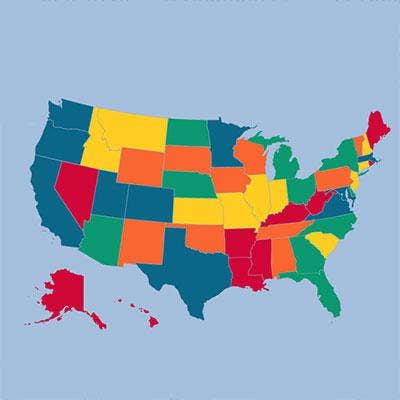
Worst To First: What Does Your State Have To Offer?
Whether a solution provider startup succeeds or fails certainly depends a great deal on a company's strategy, the strengths of its products and services, and the capabilities of its managers and employees.
But external factors also play a role in the ultimate success or failure of a solution provider and whether it thrives and grows. And those factors can vary widely according to where a startup is doing business. How abundant are the business opportunities in the geographies the solution provider is competing? Is there a large pool of experienced workers from which the company can hire the IT talent it needs? Will taxes and regulations hinder a solution provider's growth?
The following ranks all 50 states, from the worst (No. 50) to the best (No. 1) for starting and growing a solution provider business. It's based on a CRN Research analysis of a wide range of data, including the education and experience level of a state's workforce, labor and business costs, and tax and regulatory burdens. States are also ranked for innovation and growth potential and business opportunities. We've also cross-referenced the findings with CRN's 2017 Solution Provider 500, listing how many of the biggest solution providers call each state home.
Take a look. The results might surprise you.

No. 50: West Virginia (No. 50 in 2016)
Solution Provider 500: 0
West Virginia ranked last in this year's Best States study – the third year in a row the state has come in at No. 50.
Finding technical talent in The Mountain State isn't easy: It ranked No. 49 (behind only Mississippi) in the experience and education levels of its workforce. More than 73 percent of the labor force lacks a four-year college degree (No. 47). And tech industry companies employ only 2.8 percent of its private sector workforce.
The state's real GDP contracted 0.9 percent in 2016, ranking it a poor No. 46 in economic performance. The state's unemployment rate was a moderately high 4.6 percent in June (putting it at No. 34 among the states with Alaska, No. 50, having the highest unemployment rate).
West Virginia can be a tough place to start a business. It was No. 50 in the entrepreneurship and innovation criteria, No. 48 for its business climate and competitive environment, and No. 48 for state infrastructure. On the plus side, the state's relatively low 6.5 percent corporate income tax rate ranks No. 17.

No. 49: Rhode Island (No. 49 in 2016)
Solution Provider 500: 2
Rhode Island is ranked No. 50 in taxes and regulations, making it a difficult state to do business in. While its 7 percent corporate income tax is in the middle of the pack (No. 31), the Tax Foundation ranks Rhode Island No. 44 among all states on its 2017 State Business Tax Climate Index because of its complex, high-cost tax climate that includes high unemployment insurance taxes (No. 50) and high property taxes.
Rhode Island also has high labor and operating costs (No. 47 among all states) and a poor state infrastructure ranking (No. 49). While the state was slow to exit The Great Recession and had some of the highest unemployment rates in the country several years ago, its 4.2 percent unemployment rate in mid-2017 was about the same as the national average.
The Ocean State is in the middle of the pack for the overall education and experience level of its workforce (No. 23), although 13.4 percent of its adult population 25 and older has an advanced degree (No. 10).
Rhode Island ranked No. 27 for overall entrepreneurship and innovation despite a low No. 44 ranking by the 2017 Kauffman Index for startups. The technology sector accounts for 5.4 percent of total gross state product, No. 27 among the states.

No. 48: Alaska (No. 42 in 2016)
Solution Provider 500: 1
Alaska's overall ranking takes a hit from its No. 50 rank in labor, energy and other business costs: Despite being an oil-producing state, it has some of the highest commercial electricity costs in the nation.
The Last Frontier state is No. 49 in business climate and competitive environment – not surprising given its sparse population and relative paucity of private sector businesses (No. 50). But the state also suffered a whopping 5.0 percent decline in real GDP in 2016. It also has the highest unemployment rate in the nation at 6.8 percent. And Alaska ranks a poor No. 42 for the overall education and experience level of its workforce.
Alaska does boast a relatively good ranking (No. 20) in taxes and regulations. While it has a high (9.40 percent) corporate income tax rate, the Tax Foundation ranks the state No. 3 in its 2017 State Business Tax Climate Index given its low (1.76 percent) sales tax and lack of a personal income tax.
And Alaska ranks No. 3 in cost of living/quality of life thanks to the lack of a personal income tax and the second highest median household income ($72,515) in the U.S.

No. 47: Hawaii (No. 44 in 2016)
Solution Provider 500: 0
Hawaii may be paradise for some, but apparently not for starting a solution provider business.
The Aloha State is No. 50 for state infrastructure (39 percent of roads are in poor condition, No. 47 among the states). It's an expensive place to live and work: CNBC America's Top States for Business ranks Hawaii No. 50 in cost of living, including having the highest median monthly housing costs ($1,438) in the country. And it's ranked No. 50 for high electricity costs.
On the entrepreneurship and innovation side, Hawaii is hardly a technology mecca at No. 46. The technology sector accounts for only 3.3 percent of Hawaii's total gross state product (ranked No. 43) and the state was ranked No. 44 for tech industry employment.
Hawaii's No. 24 rank for taxes and regulations is helped by its relatively low (6.40 percent) corporate tax rate, but hurt by its 8.25 individual income tax rate. In 2016 the state's real GDP grew a healthy 2.1 percent, No. 9 among all states.

No. 46: Maine (No. 43 in 2016)
Solution Provider 500: 1
Maine is ranked No. 47 in taxes and regulations. Its 8.93 percent corporate tax rate and 10.15 percent individual income tax rate are among the highest in the country and The Pine Tree State has high unemployment insurance and property taxes. While Maine's 5.50 percent sales tax is among the lowest in the U.S., the Tax Foundation ranks Maine a relatively poor No. 30 on its 2017 State Business Tax Climate Index.
Maine scores lackluster rankings for labor and operating costs (No. 30), workforce education and experience (No. 31) and entrepreneurship and innovation (No. 32) – the latter despite ranking No. 13 on the Kauffman Index for startup growth rates.
The state is ranked No. 40 for business climate and competitive environment – the Forbes Best States for Business 2016 ranked Maine a dismal No. 49 for overall business climate. On the plus side, CNBC America's Top States for Business ranks Maine No. 7 for quality of life.

No. 45: Louisiana (No. 39 in 2016)
Solution Provider 500: 4
Louisiana's overall ranking is pulled down by its poor performance in workforce education and experience, and in entrepreneurship and innovation – ranked No. 47 in both criteria.
Nearly 73 percent of the state's workforce lacks a four-year college degree (No. 45). The technology sector accounts for only 2.8 percent of total gross state product (No. 47 among the states) and technology industry companies employ only 2.9 percent of The Pelican State's private sector workforce (No. 44).
Louisiana is ranked No. 17 for its tax and regulatory burden despite having a 9.98 percent sales tax – the highest in the country.
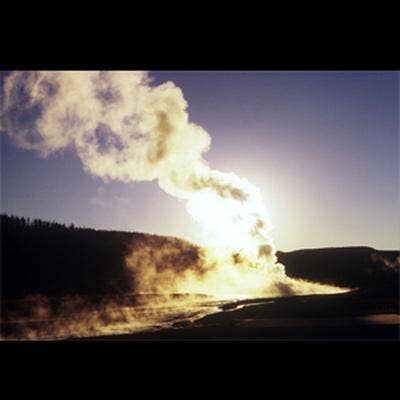
No. 44: Wyoming (No. 48 in 2016)
Solution Provider 500: 1
Wyoming is ranked No. 50 in business climate and competitive environment: It's tough to start and grow a solution provider business in a state with such a sparse population (585,000, the smallest in the U.S.) and the smallest number of small and midsize businesses (34,537) that traditionally account for the bulk of solution provider customers. And the Cowboy State's GDP declined 3.6 percent in 2016.
The relatively small number of solution providers in the state, however, does mean limited competition – Wyoming is No. 1 on the solution provider competitive saturation index.
Wyoming is ranked No. 21 for taxes and regulations: While Wyoming has relatively high property and unemployment insurance taxes, it has no corporate or personal income tax and the sales tax rate is a low 5.40 percent. The Tax Foundation ranks the state No. 1 on its 2017 State Business Tax Climate Index.

No. 43: Arkansas (No. 45 in 2016)
Solution Provider 500: 1
Arkansas is ranked No. 5 for having relatively low labor costs and low business costs such as electricity.
The Natural State is No. 46 in worker education and experience, however, with only 2.8 percent of its private sector workforce employed by tech industry companies. And it's No. 44 in entrepreneurship and innovation with the tech sector accounting for only 3.3 percent of total gross state product.
Arkansas is ranked No. 4 in cost of living by CNBC America's Top States for Business. But its $41,371 median household income is No. 49 among all the states.

No. 42: Mississippi (No. 35 in 2016)
Solution Provider 500: 3
Mississippi is ranked No. 50 for the education and experience of its workforce. The share of the state's labor force without a four-year college degree stands at 75.7 percent, the highest in the country.
On the plus side, The Magnolia State is ranked No. 8 for its low tax and regulatory burden. Its corporate and personal income tax rates are both 5.0 percent. While the state's 7.07 percent sales tax is about average among all states, it has low unemployment insurance costs.
Mississippi ranks poorly in other criteria including labor and operating costs (No. 45), entrepreneurship and innovation (No. 43), and business environment and competitive environment (No. 43).
Mississippi is ranked No. 1 in CNBC America's Top States for Business for having the lowest cost of living. But that's balanced out by the state's $39,665 median household income – the lowest in the country.
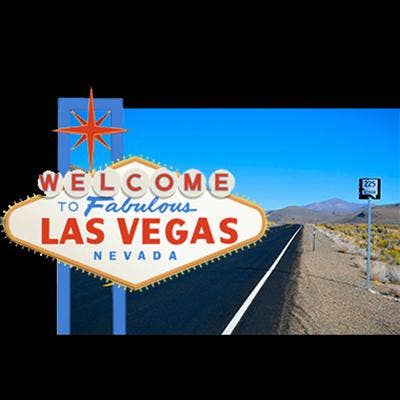
No. 41: Nevada (No. 46 in 2016)
Solution Provider 500: 0
Nevada's best ranking (No. 26) is in business climate and competitive environment. The state's 2.4 percent increase in real GDP in 2016 ranked No. 8 in the country and CNBC America's Top States for Business ranked the state's economic growth prospects at No. 10. The Silver State increased its total employment by 2.6 percent in 2016.
But Nevada ranks a dismal No. 48 in worker education and experience with 73.9 percent of the labor force lacking a college degree. The state is No. 45 in entrepreneurship and innovation: The state is last among all states in startup survival rates, according to the 2017 Kauffman Index, and CNBC America's Top States for Business ranks it last for technology and innovation.
Nevada has no corporate or personal income tax, but its 7.98 percent sales tax is relatively high. The Tax Foundation ranks Nevada at No. 5 on its 2017 State Business Tax Climate Index.

No. 40: Kentucky (No. 38 in 2016)
Solution Provider 500: 4
Kentucky ranks No. 20 in infrastructure – only 8 percent of its roads are in poor condition, third best in the nation – and the state offers a low cost of living (No. 10, according to CNBC America's Top States for Business).
The Bluegrass State scores a middling No. 27 for business climate and competitive environment: Its 1.3 percent real GDP growth in 2016 was No. 22 among all states. But Kentucky is a next-to-last No. 49 in entrepreneurship and innovation with low scores for startup growth (No. 48), a No. 45 ranking on the Bloomberg U.S. State Innovation Index, and a tech sector that accounts for only 3.4 percent of total gross state product (No. 42).
Kentucky also fares poorly in the tax and regulations department (No. 48), due in part to its high unemployment insurance tax. Kentucky's corporate and personal income taxes and sales tax are all set at 6.0 percent.
And in the infrastructure department, Kentucky was No. 50 in average peak internet speeds, a potential hindrance to a startup IT business.

No. 39: Vermont (No. 29 in 2016)
Solution Provider 500: 0
Vermont has some things going for it, chiefly the education and experience levels of its workforce (No. 17) including a relatively high number of people 25 years and older who hold an advanced degree (14.6 percent for a No. 6 ranking).
The Green Mountain State scores middle-of-the-pack rankings for labor and operating costs (No. 28), entrepreneurship and innovation (No. 23), and taxes and regulations (No. 25) – the latter despite relatively high corporate and personal income taxes (8.50 and 8.95 percent, respectively).
But Vermont's overall ranking takes a hit from its No. 46 rank in business climate and competitive environment. The state's $31.1 billion GDP is the smallest among all states and it grew a modest 0.8 percent in 2016. It's population and number of small and midsize businesses is second only to Wyoming.
Vermont has the lowest violent crime rate in the country.
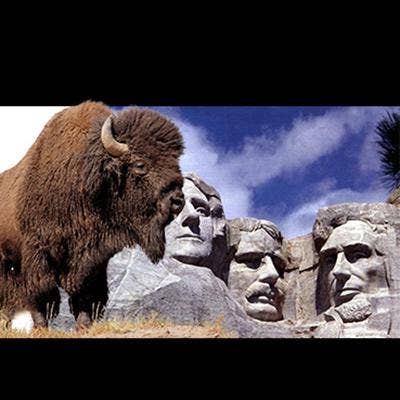
No. 38: South Dakota (No. 25 in 2016)
Solution Provider 500: 1
South Dakota is No. 7 in labor and business costs – the state's 3.0 percent unemployment rate is the sixth-best in the country.
But the Mount Rushmore State is ranked a poor No. 48 in entrepreneurship and innovation. The state is last among states in startup growth, according to the 2017 Kauffman Index. CompTIA ranks South Dakota No. 49 for tech industry employment, and the tech sector accounts for only 3.2 percent of total gross state product.
South Dakota's No. 44 rank in workforce education and experience suffers from a relatively high percentage (70.9) of the labor force that lacks a four-year college degree.
The state fares somewhat better (No. 30) on the tax and regulations front: South Dakota has no corporate or personal income tax and a moderate (6.39 percent) sales tax. Despite having a high unemployment insurance tax rate, the Tax Foundation ranks the state No. 2 on its State Business Tax Climate Index.

No. 37: Montana (No. 20 in 2016)
Solution Provider 500: 0
Montana took a tumble in our overall rankings this year, hit by a significant slowdown in GDP growth (from 1.5 percent in 2015 to 0.2 percent in 2016) that contributed to the state's No. 45 rank in business climate/competitive environment. Montana's startup rate also seemed to slow last year, pulling down its entrepreneurship/innovation rank to No. 40.
The Treasure State does do well in the taxes and regulations category (No. 13). It has no sales tax, a middling 6.75 percent corporate income tax and a 6.9 percent personal income tax. The Tax Foundation ranks Montana No. 6 on its State Business Tax Climate Index.
And Montana ranks No. 2 in personal cost of living/quality of life, driven by its low personal income tax burden and low rental costs.

No. 36: New Mexico (No. 37 in 2016)
Solution Provider 500: 1
New Mexico is ranked No. 12 in entrepreneurship and innovation with the tech sector accounting for 7.9 percent of total gross state product (No. 13) and ranking No. 6 on the Kauffman Index for startup growth.
The Land of Enchantment state also ranks a respectable No. 18 on the tax burden front because of a lack of property taxes and moderate corporate income (6.20 percent) and personal income (4.90 percent) tax rate. Its 7.55 percent sales tax is on the high side.
But New Mexico ranks a poor No. 41 in business climate/competitive environment. The state's GDP declined 0.5 percent in 2016 (ranking it No. 44 in GDP performance) and its economic outlook received low scores from Forbes Best States for Business and CNBC America's Top States for Business.
And the state ranked No. 48 in labor and operating costs: Its 6.4 percent unemployment rate was second only to Alaska's 6.8 percent.

No. 35: Connecticut (No. 40 in 2016)
Solution Provider 500: 9
Connecticut has something of a split personality with a range of high and low rankings. The state, for example, is No. 6 in workforce education and experience, thanks to the 16.7 percent of people 25 and older who have an advanced degree (No. 3). And it's ranked No. 20 in entrepreneurship and innovation.
But The Constitution State is No. 49 in labor and operating costs (second only to Alaska), a score pulled down by high energy costs and a 5.0 percent unemployment rate.
Connecticut's personal cost of living/quality of life rank (No. 45) is hurt by the state's expensive cost of living and high personal income and sales taxes.
And the state gets one of the lowest rankings (No. 47) for state infrastructure. With 57 percent of its roads in poor condition, Connecticut is ranked No. 50.

No. 34: Idaho (No. 33 in 2016)
Solution Provider 500: 2
With the lowest electricity costs of any state, Idaho is ranked No. 2 in labor and operating costs. The Gem State grew its employed workforce by 3 percent last year, ranking it No. 5, and its relatively low 3.1 percent unemployment rate was No. 8 among the states.
Idaho doesn't fare as well in other metrics, however. It's No. 43 in workforce education and experience: 71 percent of the workforce lacks a four-year college degree. And it's No. 45 in taxes and regulations, thanks to 7.4 percent corporate and individual income tax rates and high unemployment insurance taxes.
The state also ranks a poor No. 46 in state infrastructure, including low scores for public transit.
Idaho is ranked No. 8 in personal cost of living/quality of life given its low cost of living (No. 6) and low violent crime rate (No. 8).

No. 33: Oklahoma (No. 24 in 2016)
Solution Provider 500: 4
Oklahoma is ranked No. 2 in taxes and regulations, second only to Florida. The Sooner State has the lowest unemployment insurance taxes and relatively low 5 percent individual and 6 percent corporate income tax rates. (But the state does have a relatively high 8.86 percent sales tax.)
Oklahoma doesn't fare as well in other criteria, however. The state is No. 45 in workforce education and experience: Seventy percent of the labor force lack a four-year college degree and only 2.9 percent of private sector workers are employed by tech industry firms (No. 44).
Other Oklahoma scores tend toward the middle including entrepreneurship and innovation (No. 34), business climate and competitive environment (No. 39) and state infrastructure (No. 24).
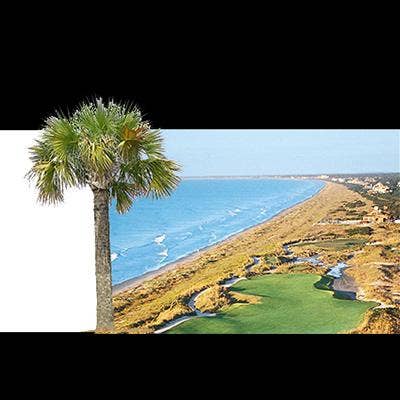
No. 32: South Carolina (No. 30 in 2016)
Solution Provider 500: 3
South Carolina ranks a respectable No. 16 on labor and operating costs. A "right to work" state, South Carolina has the lowest rate of union affiliation of employed wage and salary workers among the 50 states. The state also grew the number of jobs in the state by 2.4 percent in 2016.
The Palmetto State is No. 22 in business climate and competitive environment, thanks to its robust economy that recorded 2.1 percent GDP growth in 2016, No. 9 among the states.
But the state ranks only No. 39 for its workforce education and experience and No. 41 for entrepreneurship and innovation.
And for such a conservative state, South Carolina ranks a surprisingly mediocre No. 35 on taxes and regulations: Its corporate income tax is only 5 percent, but the personal income tax rate is 7 percent and its sales tax is 7.22 percent. The Tax Foundation ranks South Carolina No. 37 on its State Business Tax Climate Index.

No. 31: Delaware (No. 32 in 2016)
Solution Provider 500: 0
Delaware ranks No. 6 for taxes and regulations, largely because it has no sales tax. But its corporate income tax (8.7 percent) is among the nation's 10 highest while its 6.6 percent personal income tax is in the top 20.
The First State ranks a middling No. 27 in workforce education and experience, and No. 26 in entrepreneurship and innovation – the latter despite ranking No. 41 in both tech industry employment and the number of tech business establishments, according to CompTIA.
But Delaware stumbles in business climate and competitive environment where it ranks No. 44. Its real GDP grew only 0.3 percent in 2016 (No. 41).

No. 30: Alabama (No. 47 in 2016)
Solution Provider 500: 3
This year CRN added state infrastructure to its Best States analysis and that gave Alabama a significant boost from its overall ranking last year. Alabama, the Yellowhammer State, was No. 17 in infrastructure – a score that got a boost from the state's No. 1 ranking in road conditions with only 2 percent of the state's roads judged to be in poor condition.
Alabama was ranked No. 14 in taxes and regulations with moderate corporate income (6.5 percent) and personal income (5 percent) taxes and low unemployment insurance taxes. (Offset, somewhat, by a 9.01 percent sales tax, the nation's fourth highest.)
The state ranked only No. 40 in workforce education and experience – 71.9 percent of the workforce lacks a four-year college degree. It was No. 42 in entrepreneurship and innovation and only marginally better (No. 32) in business climate and competitive environment, the latter helped by the state's 1.3 percent real GDP growth last year.

No. 29: North Dakota (No. 21 in 2016)
Solution Provider 500: 1
North Dakota was flying high during the oil boom a few years ago, but has seen tougher times since oil prices collapsed.
That would explain the state's No. 47 rank in business climate and competitive environment, hard hit by the precipitous 6.5 percent decline in the state's real GDP in 2016 – the biggest in the nation. The Peace Garden State also ranks No. 47 in the number of small and midsize businesses that make up the bulk of many solution providers' customer base.
North Dakota can be an inexpensive place to do business, ranked No. 9 in labor and business costs and No. 10 in taxes. The state's corporate income tax (4.31 percent) and individual income tax (2.9 percent) are among the country's lowest, while its 6.78 percent sales tax is a bit higher than the median among all states.
North Dakota is dead last in the percent of people 25 or older that have an advanced degree (7.7 percent). Other factors – including the lowest percentage among all states of people who have an advanced degree (7.7 percent) – bring the overall workforce education and experience ranking to No. 41.

No. 28: Iowa (No. 41 in 2016)
Solution Provider 500: 3
Iowa's overall rank in the Best States analysis takes a hit from its poor (No. 42) rank on taxes and regulations. And that's largely due to The Hawkeye State's 12 percent corporate income tax – the highest in the U.S. It also has a high personal income tax (8.98 percent) and high property and unemployment insurance taxes. Its sales tax (6.8 percent) is around the median of all states.
Iowa's high taxes are offset somewhat by the state's No. 14 rank for relatively low labor and business costs and a low (3.2 percent) unemployment rate.
The state's rankings are otherwise in the middle of the pack, including No. 29 for workforce education and experience, 36 for entrepreneurship and innovation (the Kauffman Index ranks the state No. 45 for startup growth), and No. 31 for business climate and competitive environment.

No. 27: Kansas (No. 34 in 2016)
Solution Provider 500: 5
Kansas is in almost the opposite situation from Iowa in that it ranks a respectable No. 15 for taxes and regulations, thanks to moderate corporate and personal income taxes (7 and 5.2 percent, respectively) and low unemployment insurance taxes. (The Sunflower State's 8.62 percent sales tax is the eighth highest in the nation, however).
On the flip side Kansas is ranked No. 42 for business climate and competitive environment: Its real GDP grew only 0.2 percent in 2016 and CNBC America's Top States for Business ranked the state No. 46 for growth prospects.
Kansas is ranked No. 23 for labor and operating costs and No. 22 for workforce education and experience.
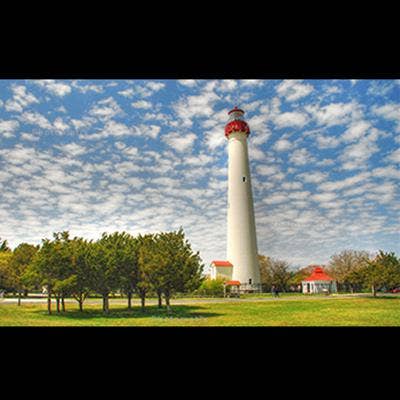
No. 26: New Jersey (No. 26 in 2016)
Solution Provider 500: 27
New Jersey boasts one of the most educated and experienced workforces in the country (ranked No. 4) – 14.3 percent of adults 25 and older have an advanced degree (No. 8).
The Garden State is No. 14 in entrepreneurship and innovation and No. 16 in business climate and competitive environment. The technology sector accounts for 8 percent of New Jersey's total state gross product (No. 11 among all states) and the state is ranked No. 11 by CompTIA for tech industry employment.
But New Jersey isn't very business-friendly from a taxes and regulations standpoint (No. 40). The Tax Foundation ranks it No. 50 among all states for having the highest property taxes. The state's 9 percent corporate income tax and 8.97 percent personal income tax are among the nation's highest.
New Jersey is also ranked a poor No. 48 for personal cost of living and quality of life. While the state has the third highest median household income ($72,093), high housing costs and other expenses pull down the state's score.

No. 25: Wisconsin (No. 31 in 2016)
Solution Provider 500: 12
Wisconsin's overall No. 25 rank reflects the state's scores that tend toward the middle of the pack among all 50 states. The Badger State, for example, is ranked No. 26 in workforce education and experience, No. 29 in entrepreneurship and innovation, and No. 24 in business climate and competitive environment.
Wisconsin is ranked a mediocre No. 33 in the tax and regulatory burden department, largely because of its high property and unemployment taxes and its 7.65 percent personal income tax (among the nation's 10 highest). The Tax Foundation ranks Wisconsin No. 39 on its State Business Tax Climate Index.
The state ranked a favorable No. 9 in state infrastructure.

No. 24: Tennessee (No. 28 in 2016)
Solution Provider 500: 3
Tennessee is ranked No. 11 for labor and operating costs, a score that got a boost from the 2.5 percent job growth the state reported in 2016.
The Volunteer State also ranked a respectable No. 19 in business climate and competitive environment. The state's real GDP grew 2 percent in 2016 (No. 12 among the states) and CNBC America's Top States for Business ranked it No. 5 for growth prospects.
But Tennessee ranked No. 33 on workforce education and experience and No. 39 for entrepreneurship and innovation. The state ranked No. 26 on taxes and regulations: While the state has the second highest sales tax in the country (9.46 percent), according to the Tax Foundation, its other taxes are in the low-to-moderate range.
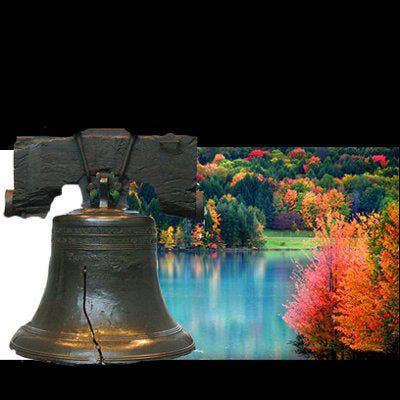
No. 23: Pennsylvania (No. 36 in 2016)
Solution Provider 500: 13
Pennsylvania receives solid scores in some criteria in the Best States analysis and not-so-great scores in others.
The Keystone State achieves its highest rank (No. 12) in workforce education and experience: CNBC America's Top States for Business ranked the state No. 10 for the education attainment level of its workforce.
Pennsylvania ranks No. 16 in entrepreneurship and innovation: CompTIA ranked the state No. 12 for the number of tech business establishments and No. 8 in tech industry employment. And Pennsylvania ranked No. 15 in business climate and competitive environment: The state is No. 5 in the number of small and midsize businesses that are prospective customers for solution providers.
But Pennsylvania is No. 46 in the taxes and regulations department. Its 9.99 percent corporate tax rate is second only to Iowa and it imposes high unemployment insurance taxes. But it does have a low personal income tax rate (3.07 percent) and moderate sales tax (6.34 percent).

No. 22: Nebraska (No. 15 in 2016)
Solution Provider 500: 2
Nebraska is ranked an enviable No. 6 in labor and operating costs. The state's 2.9 percent unemployment rate is the fourth lowest in the country and its electricity costs are low.
The Cornhusker State is ranked No. 9 for taxes and regulations, given its low unemployment insurance tax and middling corporate income and personal income tax rates (7.81 percent and 6.84 percent, respectively). Its 6.89 percent sales tax is ranked No. 25 among the 50 states.
But Nebraska doesn't do as well in other business metrics. It's No. 25 in workforce education and experience, No. 34 in business climate/competitive environment, and No. 35 in entrepreneurship and innovation. The tech sector is only 4 percent of Nebraska's total gross state product (No. 34). The state's 1.2 percent GDP growth rate in 2016 was No. 26 among all 50 states.

No. 21: New Hampshire (No. 22 in 2016)
Solution Provider 500: 5
New Hampshire is No. 10 for entrepreneurship and innovation and it's easy to see why.
The tech sector accounts for 10.1 percent of total gross state product, ranking it No. 7 among all states on that metric. It's also No. 7 for venture capital funding per 100,000 residents ($13,729,749). The Kauffman Index ranks New Hampshire fifth among the states for startup growth. And Bloomberg ranked the company No. 10 on its U.S. State Innovation Index.
The Granite State is ranked No. 9 in the percent of people who have an advanced degree (13.7 percent) and No. 8 for the percent of private sector workers employed by technology industry firms (7.5 percent).
But the state stumbles on the tax front where it's ranked a lackluster No. 41. While the state has no sales tax and a relatively low personal income tax rate (5 percent), its corporate income tax rate of 8.2 percent is in the top dozen in the nation and it has high unemployment taxes.
New Hampshire's low personal income tax and lack of a sales tax, however, are instrumental to the state's enviable No. 1 rank in personal cost of living/quality of life.

No. 20: Arizona (No. 18 in 2016)
Solution Provider 500: 11
Arizona is ranked No. 11 in taxes and regulations, with low corporate (4.9 percent) and personal (4.54 percent) income tax rates. That's offset, somewhat, by the high 8.25 percent sales tax (among the dozen highest in the country, according to the Tax Foundation).
The Grand Canyon State's No. 14 rank in business climate/competitive environment got a boost from its 2.1 percent GDP growth in 2016 (No. 9 among the states).
But Arizona's other rankings aren't so impressive, including No. 32 in labor and operating costs, No. 30 in workforce education and experience, and No. 21 in entrepreneurship and innovation.
The state's 5.1 percent unemployment rate is among the nation's highest despite reporting 2.4 percent job growth (No. 11) in 2016.

No. 19: Indiana (No. 14 in 2016)
Solution Provider 500: 6
Indiana's overall Best States rank is buoyed by its No. 5 rank on the taxes and regulations criteria. The Hoosier State's corporate income tax rate is set at a moderate 6.25 percent rate while the individual tax rate is a low 3.23 percent. The sales tax is set at 7 percent while the state has low property and unemployment insurance taxes.
On the labor front Indiana's 3 percent unemployment rate (sixth lowest in the nation) contributes to the state's No. 13 rank for labor and operating costs.
Indiana ranks No. 32 on workforce education and experience, No. 33 on entrepreneurship and innovation, and No. 21 on business climate/competitive environment.

No. 18: Illinois (No. 27 in 2016)
Solution Provider 500: 30
Illinois has been wrestling with a very visible budget crisis this year, so it's somewhat surprising the Prairie State has moved up in the Best States rankings. In July the state legislature approved a budget – its first in two years – and a tax increase that avoided having its credit ratings downgraded to "junk" status.
This year's Best States analysis ranked Illinois No. 44 in taxes and regulations, and that was based on data prior to the July vote to hike corporate income taxes to 7 percent from 5.25 percent and individual rates to 4.95 percent from 3.75 percent. So that No. 44 tax rank may be optimistic.
Illinois is No. 11 in the category of workforce education and experience, No. 18 in entrepreneurship and innovation (the state is ranked No. 4 for the number of tech business establishments), and No. 13 in business climate/competitive environment.

No. 17: New York (No. 9 in 2016)
Solution Provider 500: 45
New York, like other tech-heavy states like California and Massachusetts, is a study in contrasts with deep pools of educated, innovative workers and lots of business opportunities combined with high costs and high taxes.
New York is ranked No. 3 for the depth of its educated, experienced workforce (behind only Virginia and Massachusetts). The Empire State is ranked No. 6 in entrepreneurship and innovation: It was No. 3 for the number of patents issued between 2013 and 2015 and No. 4 in the amount of venture capital funding per 100,000 people (just under $30 million).
The state was No. 5 for tech industry establishments and No. 3 for tech industry employment. And it was No. 9 in business climate and competitive environment.
New York, however, is No. 46 for labor and operating costs. And the state is No. 43 in taxes and regulations: While its corporate income tax rate is a moderate 6.5 percent, its 8.82 percent personal income tax rate and 8.49 percent sales tax are both among the nation's 10 highest. The Tax Foundation ranks New York a discouraging No. 49 on its State Business Tax Climate Index, behind only New Jersey.
New York ranks No. 49 on the personal cost of living/quality of life index.
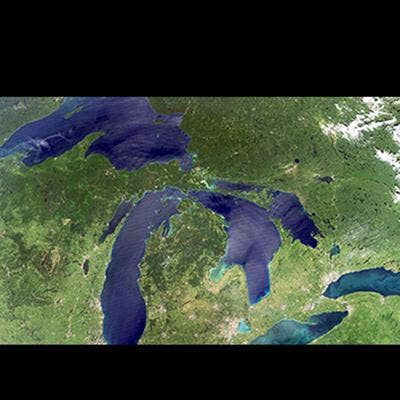
No. 16: Michigan (No. 16 in 2016)
Solution Provider 500: 13
Michigan is in somewhat the same position as New York, although not with such extreme rankings.
The Great Lakes State is ranked No. 11 in both the entrepreneurship/innovation and business climate/competitive environment criteria. The innovation grade gets a boost from the state's No. 10 rank for tech industry employment, and the tech sector accounts for 6.6 percent of total gross state product (ranked No. 18).
The state also receives a favorable No. 14 rank for workforce education and experience.
Michigan, however, is rated a middling No. 25 for labor and operating costs. And the state is No. 39 in taxes and regulations: While its corporate income tax rate is set at 6 percent and personal income tax rate at 4.25 percent, the state does have high unemployment insurance and property taxes.

No. 15: Minnesota (No. 23 in 2016)
Solution Provider 500: 15
Minnesota is ranked No. 8 in workforce education and experience. The North Star State is ranked No. 17 in the percentage of residents 25 or older who completed an advanced degree (11.8 percent). And tech industry firms employ 5.8 percent of the private sector workforce.
Minnesota is ranked No. 15 in entrepreneurship and innovation and No. 17 in business climate/competitive environment. The state was No. 9 in the number of patents issued between 2013 and 2015 and it was No. 17 in both the number of tech business establishments and tech industry employment. CNBC America's Top States for Business ranked Minnesota No. 5 for technology and innovation.
But Minnesota is ranked No. 34 for taxes and regulations. Its corporate tax rate is set at 9.8 percent, third behind only Iowa and Pennsylvania, while its personal income rate is 9.85 percent, fourth highest in the U.S.

No. 14: Maryland (No. 19 in 2016)
Solution Provider 500: 20
Maryland is ranked No. 2 in entrepreneurship and innovation, behind only Massachusetts. The Kauffman Index ranks Maryland No. 4 for startup growth rates and the tech sector accounts for 8.8 percent of total gross state product (No. 8).
The Old Line State also shines with its No. 7 ranking for its educated and experienced workforce. It's No. 2 in the percentage who have an advanced degree (17.7 percent). And tech industry firms employ 8.6 percent of the state's private sector workforce (No. 4).
Maryland is ranked No. 26 for labor and operating costs and No. 27 for tax and regulatory burdens. The state is ranked a poor No. 46 for cost of living/quality of life despite having the highest median household income among all states ($74,551).

No. 13: Missouri (No. 12 in 2016)
Solution Provider 500: 8
Missouri ranks No. 7 in taxes and regulations, offering moderate corporate income (6.25 percent) and personal income (6.0 percent) tax rates and low property and unemployment insurance taxes. (But its sales tax is relatively high at 7.89 percent.)
The Show Me State otherwise tallies middle-of-the-pack scores across many of the Best States criteria, ranking No. 20 in labor and operating costs and No. 19 in workforce education and experience. The state's No. 31 ranking on entrepreneurship and innovation is nothing to write home about while it does a bit better (No. 25) in business climate and competitive environment.
Missouri is ranked No. 13 in both personal cost of living/quality of life and in state infrastructure. While the state has a relatively low cost of living (No. 11, according to the CNBC America's Top States for Business), its $48,173 median household income is only No. 36 among all states.

No. 12: Georgia (No. 17 in 2016)
Solution Provider 500: 20
Georgia has a lot going for it as a state in which to start and grow a solution provider business. The Best States analysis ranked it No. 4 for business climate and competitive environment: The 2017 CNBC America's Top States for Business scored the state at No. 1 for growth prospects and its 3 percent real GDP growth in 2016 was third best among all states (tied with New Hampshire and Utah).
The Peach State is ranked No. 2 in public infrastructure: Only 4 percent of its roads are deemed to be in poor condition, No. 2 among all states.
Georgia doesn't score quite so well (No. 32) in taxes and regulations. The state's corporate and personal income tax rates are both set at 6 percent, its sales tax is 7 percent and its unemployment insurance taxes are high. The relatively high personal and sales taxes also factor into the state's poor No. 40 rank in personal cost of living and quality of life.

No. 11: Ohio (No. 10 in 2016)
Solution Provider 500: 10
Ohio ranks an enviable No. 3 in taxes and regulations, thanks to its lack of a corporate income tax, moderate (4.997 percent) individual income taxes, and low property and unemployment insurance taxes.
The Buckeye State also does well in business climate/competitive environment where it ranks No. 6: Its real GDP grew 1.7 percent in 2017 (No. 17 among the states) and it is ranked No. 9 in the number of small and mid-size businesses (550,209) that often comprise the bulk of solution provider customers.
Ohio, however, ranks a poor No. 40 in labor and operating costs criteria. Its 5 percent unemployment rate is No. 42 among the 50 states.

No. 10: Utah (No. 2 in 2016)
Solution Provider 500: 2
Utah has been No. 1 on the Best States list in the past and the state remains in the top 10 of business-friendly states.
The Beehive State is No. 3 in labor and operating costs. The state grew its workforce by 3.2 percent in 2016 (No. 2 among the states) and only 4.7 percent of those workers are unionized.
Utah also offers a favorable tax and regulatory environment with 5 percent corporate and personal income tax rates – the latter also contributing to the state's No. 7 rank in personal cost of living/quality of life.
The state is ranked No. 13 in entrepreneurship and innovation, and No. 20 in business climate/competitive environment. But Utah could do better in workforce education and experience where it's ranked only No. 28, despite the fact that 7.6 of its private sector workforce is employed by technology industry firms.
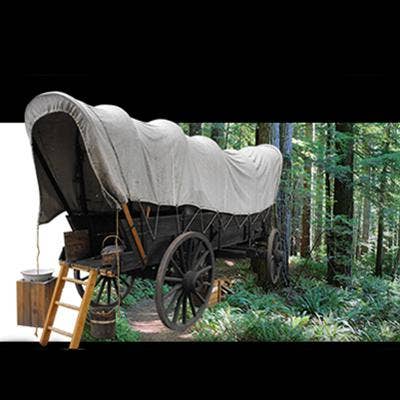
No. 9: Oregon (No. 11 in 2016)
Solution Provider 500: 4
Oregon ranks No. 8 in business climate/competitive environment and No. 9 in entrepreneurship and innovation, evidence that the Beaver State has a lot to offer to solution provider startups.
The tech sector accounts for 18 percent of Oregon's total gross state product – No. 1 among all states. And the state's 3.3 percent real GDP growth in 2016 was No. 2 in the nation.
Oregon also ranks a favorable No. 17 in labor and operating costs: The state grew its workforce by 3.4 percent in 2016 – No. 1 among all states. And the state is No. 15 in workforce education and experience: Tech industry firms employ 6.2 percent of private sector workers, No. 11 among all states.
Oregon's Achilles' heel is its No. 29 rank in taxes and regulations. While it has no sales tax, the state's 9.9 percent personal income tax is the nation's third highest and its 7.6 percent corporate income tax is on the high side.

No. 8: Virginia (No. 3 in 2016)
Solution Provider 500: 42
Virginia is ranked No. 1 in labor and operating costs, largely thanks to low electricity costs, and No. 2 in workforce education and experience. The latter is buoyed by the 9.5 percent of the private sector workforce employed by tech industry firms (No. 2 among all states) and the Old Dominion State's No. 4 ranking in the percentage of people 25 and older with an advanced degree (15.7 percent).
Virginia also ranks an impressive No. 4 in entrepreneurship and innovation: The state ranks No. 6 in the number of tech business establishments, in tech industry employment and in the tech sector as a percentage (10.7) of total gross state product.
Virginia ranks a mediocre No. 31 in taxes and regulations, however. While its 5.63 percent sales tax is relatively low, its 6 percent corporate income tax and 5.75 personal income tax rates are closer to the average of all states and its unemployment insurance taxes are high.

No. 7: Massachusetts (No. 13 in 2016)
Solution Provider 500: 16
Massachusetts ranks No. 1 in the education and experience level of its workforce. The state ranks No. 1 in the percentage of people with advanced degrees (18.4 percent). And the Bay State is No. 1 in the percentage of private sector workers employed by tech industry firms (9.9 percent).
Massachusetts is also No. 1 in entrepreneurship and innovation. The state is No. 4 for patents issued between 2013 and 2015 (19,911 patents) and No. 2 for venture capital funding in 2014-15 ($78.7 million per 100,000 people). The tech sector accounted for 12.7 percent of total gross state product (No. 3 among all states).
But Massachusetts has work to do to shed its "Taxachusetts" reputation as the state is ranked No. 49 for taxes and regulations. The state's 8 percent corporate income tax is higher than average (albeit in line with corporate taxes in other Northeastern states) while its 5.1 percent personal income tax and 6.25 percent sales tax are closer to average. But Massachusetts' ranking takes a hit from its high property and unemployment insurance taxes.

No. 6: Colorado (No. 6 in 2016)
Solution Provider 500: 14
Colorado is ranked No. 5 in entrepreneurship and innovation and No. 7 in business climate/competitive environment, making it an attractive option for starting a solution provider business.
The tech sector makes up 11.5 percent of Colorado's total gross state product, No. 5 among the states, and the state was No. 6 in venture capital funding in 2014-15 (just under $18 million per 100,000 people).
The Centennial State also scores well in labor and operating costs (No. 4) and in workforce education and experience (No. 5). Colorado is No. 7 in the percentage of people 25 and older who have an advanced degree (14.5 percent), and it's ranked No. 3 in the percentage of its private sector workers who are employed by tech industry firms (9.3 percent). The state's 2.3 percent unemployment rate is the lowest among all states.
A downside is Colorado's No. 38 rank for taxes and regulations: The state's 4.63 percent corporate income tax and personal income tax rate is low, but it has a moderately high sales tax (7.5 percent) and high unemployment insurance taxes.

No. 5: Washington (No. 8 in 2016)
Solution Provider 500: 8
Washington is ranked an impressive No. 3 for business climate/competitive environment and No. 7 for entrepreneurship and innovation – not so surprising, perhaps, for the home of such industry giants as Microsoft and Amazon.
The Evergreen State is ranked No. 3 in tech innovation in both the Bloomberg U.S. State Innovation Index and CNBC America's Top States for Business. The tech sector is 13.2 percent of Washington's total gross state product, the second highest among all states and behind only neighbor Oregon. The state reported 3.7 percent GDP growth in 2016 – No. 1 among all states.
Washington ranked No. 10 in workforce education and experience. Tech industry firms employ 8.6 percent of the state's private sector workers, No. 4 among all states. And the state increased its worker headcount by 3.1 percent last year, also ranked No. 4.
Washington has no corporate or personal income tax, but its 8.92 percent sales tax is the fifth highest in the nation.

No. 4: California (No. 4 in 2016)
Solution Provider 500: 61
California is widely seen as the center of the nation's technology industry. But is it a good place to start and grow a solution provider business?
The Golden State is No. 1 in business climate/competitive environment and No. 3 in entrepreneurship and innovation. It was ranked No. 2 in tech innovation in both the Bloomberg U.S. State Innovation Index and CNBC America's Top States for Business, behind only Massachusetts.
In the Best States analysis the state ranks No. 1 in both the number of tech business establishments (51,138) and tech industry employment (1,186,471). It was also No. 1 in venture capital funding per 100,000 people in 2014-15 ($84.2 million) and No. 1 in patents awarded between 2013 and 2015 (117,050).
But California is ranked No. 23 for its tax and regulatory burden: It has the highest personal income tax of all states (13.3 percent), a high corporate income tax (8.84 percent) and a high sales tax (8.25 percent).
It's ranked No. 42 for its high labor and operating costs. And the state is No. 50 – dead last – for personal cost of living/quality of life because of its high taxes and high housing costs.

No. 3: Texas (No. 7 in 2016)
Solution Provider 500: 22
While Texas may not generate the same high rankings in education and innovation that tech rivals like California and Massachusetts do, the Lone Star State – which takes a decidedly more "pro-business" stance than other states – offers a more balanced rankings lineup with its lower costs and reduced tax burden.
Texas is ranked No. 8 in entrepreneurship and innovation and No. 12 in business climate and competitive environment. The state ranks No. 2 in tech business establishments (36,245) and No. 2 in tech industry employment (592,960). And it's No. 3 in the number of small and midsize companies (more than 1.5 million) that most often engage solution providers. One down note: Texas' real GDP growth was a meager 0.4 percent in 2016.
Texas may not have as highly educated a workforce as some other states (it's ranked No. 20), but it does offer low labor and operating costs (No. 12) and a solid state infrastructure (No. 5).
Perhaps most enticing is the state's No. 12 ranking for taxes and regulations. It has no corporate or personal income taxes, although its 8.19 percent sales tax is high.

No. 2: North Carolina (No. 5 in 2016)
Solution Provider 500: 3
North Carolina also provides a balanced ranking across the Best States criteria. While its No. 19 ranking for entrepreneurship and innovation and No. 10 ranking for business climate/competitive environment may not match states like California, Massachusetts and Washington, it beats those states in taxes and regulations with its No. 4 rank and labor/operating costs where it's ranked No. 8.
The tech sector accounts for 6.6 percent of North Carolina's total gross state product (No. 18) and tech industry firms employ 5.6 percent of all private sector workers (also No. 18). The Tar Heel State reported 1.6 percent real GDP growth in 2016 (No. 19) and its workforce grew 2.1 percent that year (No. 15).
The Tax Foundation ranks North Carolina an attractive No. 11 on its State Business Tax Climate Index. The state has a very low 3 percent corporate income tax, and moderate personal income (5.499 percent) and sales (6.9 percent) taxes.

No. 1: Florida (No. 1 in 2016)
Solution Provider 500: 10
For the second year in a row Florida is the No. 1 state in the annual CRN Best States analysis.
The Sunshine state wins on its No. 1 ranking for taxes and regulations: There is no personal income tax, the 5.5 percent corporate income tax is among the 10 lowest in the country, and the 6.8 percent sales tax is near the median.
Florida is more than sun and low taxes, however. The state ranked No, 2 in business climate/competitive environment, second only to California. Florida is No. 2 in the number of small and midsize businesses (1.94 million) that make for prospective customers for a solution provider. And its 3 percent real GDP growth in 2016 ranked No. 3 (tied for third with Georgia, Utah and New Hampshire) among all states.
Florida, of course, may not have seemed so attractive in recent weeks as parts of the state struggle to recover from the damage from hurricane Irma. (The Best States analysis factored in a state's natural disaster preparedness and number of major disaster declarations as part of the state infrastructure score.)
But Florida's fundamentals remain strong, Irma notwithstanding, and the state is No. 1 for starting and growing a solution provider business.